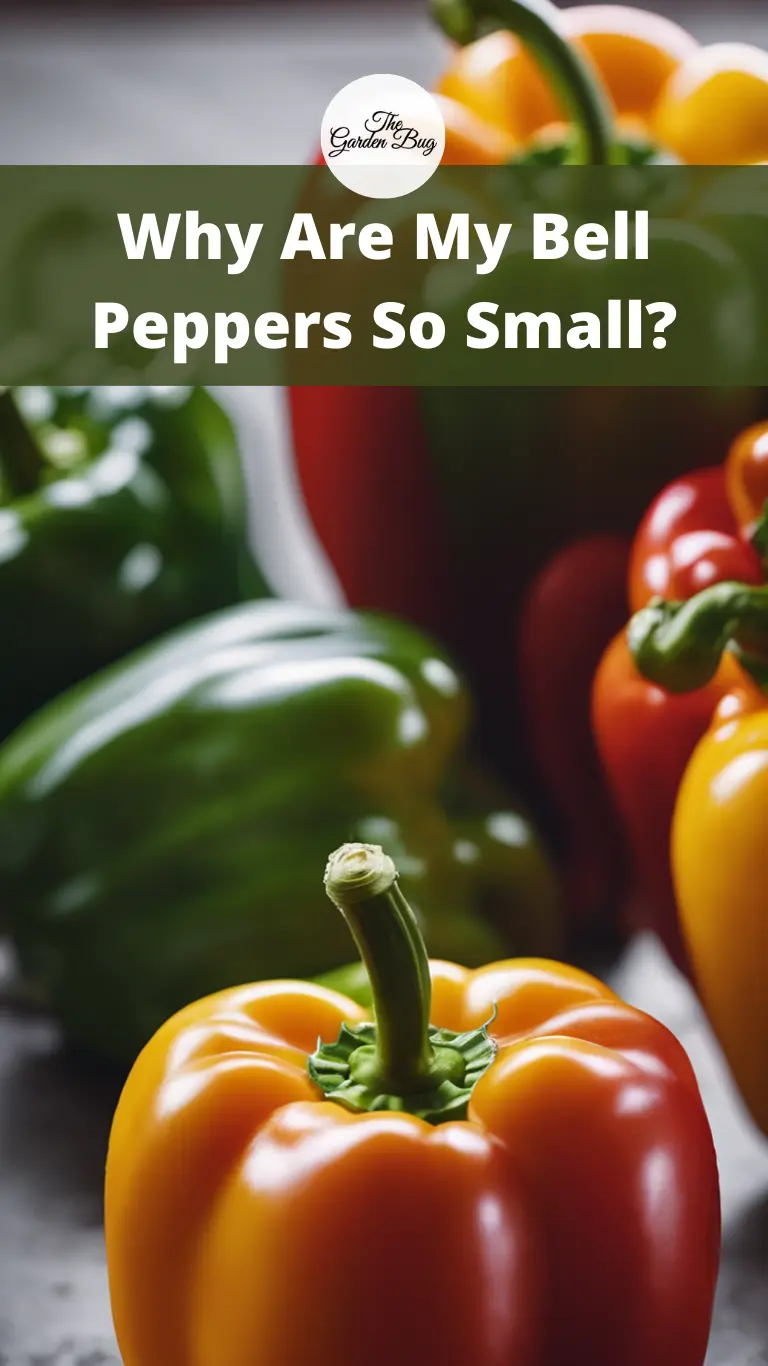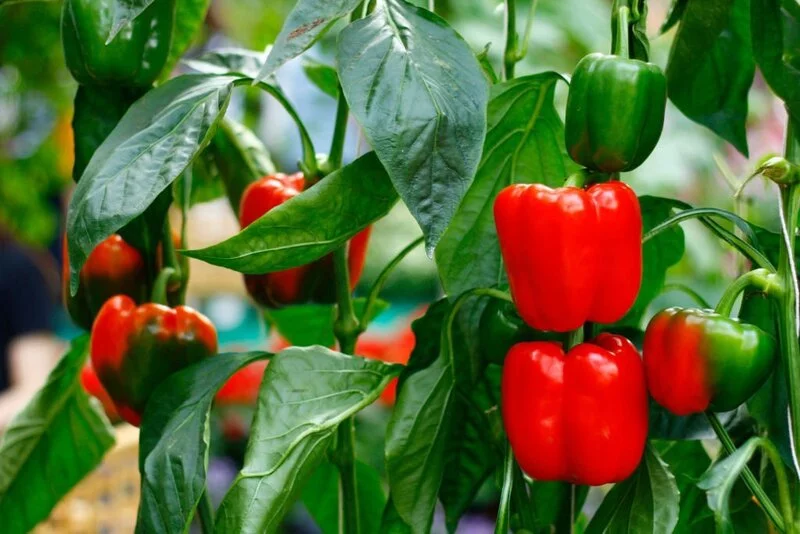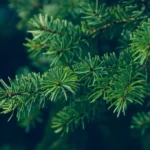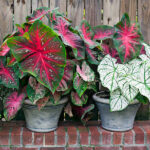Are you ever in your garden, staring down at your bell pepper plants and wondering, “Why are my bell peppers so small?”. You’re not alone! It can be a bit of a head-scratcher when these colorful veggies don’t grow as big as you’d expect. Luckily, we’re here to unravel the mystery behind small bell peppers. By understanding the growth habits of these plants and the factors that influence their development, you can guide them to their full, crunchy potential!
- Bright Red, blocky Pepper with thick walls – Great for stuffing
- Mild, sweet flavor with a hearty Crunch
- Ripen from green to Red
- Great for containers and may need to be staked
- Chopped peppers freeze well
Bell Pepper Growth
Bell peppers, also known as sweet peppers, are part of the Capsicum annuum family. They’re warm-season vegetables that thrive when the weather is just right – not too hot, and not too cold. The typical size of a bell pepper can range, but many gardeners aim for a fruit that’s about 3 to 5 inches long and about the same in diameter.
Bell pepper plants go through a series of stages in their life cycle: they start from a tiny seed, sprout into a seedling, and then grow into a mature plant that produces flowers. These flowers, when pollinated, develop into the bell peppers we know and love. Sounds simple enough, right? However, a variety of factors can affect their growth and the size of the fruit they produce.
Factors That Affect Bell Pepper Size
Many elements play a part in determining the size of your bell peppers. Let’s break them down:
- Sunlight: Bell peppers are sun-loving plants. They need at least 6-8 hours of sunlight daily to photosynthesize efficiently and produce sizable fruits.
- Water: Proper watering is crucial. Both underwatering and overwatering can cause stress to the plant, affecting its growth and fruit production.
- Nutrition: Like all plants, bell peppers need a balanced mix of nutrients. They particularly benefit from adequate levels of nitrogen, phosphorus, and potassium, as well as several trace elements.
- Temperature: Bell peppers prefer warm but not excessively hot temperatures. Extreme heat can cause stress and hinder the growth of the peppers.
- Space: Each bell pepper plant needs ample space to spread its roots. If they’re too close together, they’ll compete for resources, which can result in smaller fruits.
- 🌳 PROFESSIONALLY MIXED IN THE USA – Each bag is hand blended on our small family farm with premium horticultural grade ingredients: Coco Coir, Canadian Peat Moss, Perlite, Worm Castings- 1 QUART BAG
- ✅ PROMOTES RAPID ROOT DEVELOPMENT: With extra perlite and low-salt coconut coir, GARDENERA soil promotes rapid root development .
- 💧 SUPER MOISTURE DRAINAGE- Protects roots by quickly draining away excess water but keeping dirt moist for nutrient retention, best mimics their natural outdoor environment.
- ✅ APPROVED FOR ORGANIC GROWING: All Gardenera Organics premium potting soils are made in the USA 🇺🇸 and contain no additives, proving them great for use in organic growing.
- 🌱 DEVELOPED BY PLANT PARENTS FOR PLANT PARENTS – Crafted specifically to support the growth of Peppers. This high quality hand crafted mix is great for Peppers. It will allow your plant to grow and become large and healthy.
Common Reasons for Small Bell Peppers
Now that we understand the factors influencing bell pepper size, let’s look at why your peppers might be undersized:
- Insufficient Sunlight: If your plants aren’t getting enough sunlight, they may not be able to produce large peppers.
- Improper Watering: Both overwatering and underwatering can lead to small fruits. Plants need just the right amount of water for optimum growth.
- Lack of Nutrients: If your bell peppers aren’t getting the nutrients they need, they might not grow to their full size. A nutrient-rich soil or a balanced fertilizer can help ensure your plants get what they need.
- Crowded Plants: If your bell pepper plants are too close together, they might be competing for nutrients, water, and sunlight, which can stunt their growth.
- Extreme Temperatures: Extremely hot or cold temperatures can stress your plants and hinder their growth.
By identifying and addressing these common issues, you can help your bell peppers reach their full size. But how exactly do you do that? Stay tuned to find out!
How to Grow Larger Bell Peppers
Growing bigger bell peppers isn’t a secret science. It mostly involves giving your plants what they need and making sure they’re comfortable. Here’s how you can do it:
- Sunlight: Ensure your bell pepper plants are placed in an area where they can get 6-8 hours of sunlight daily.
- Watering: Make sure your plants are watered consistently. A good rule of thumb is to keep the soil moist but not waterlogged.
- Nutrients: Provide your plants with a balanced fertilizer that contains all the nutrients they need. A slow-release fertilizer can work wonders.
- Spacing: Give your plants plenty of room to grow. Each plant should have about 18-24 inches of space on all sides.
- Temperature: Try to keep your bell peppers in their preferred temperature range of 70-85°F (21-29°C). If you live in an area with extreme temperatures, you might need to take steps to protect your plants.
Troubleshooting Small Bell Peppers
If your bell peppers are still coming out small despite your best efforts, don’t worry! There are a few more things you can do:
- Check for pests or disease: Pests or disease can stunt your plants’ growth. Look for signs of bugs, fungus, or other health issues.
- Test your soil: A soil test can help you determine if your soil lacks specific nutrients. You can then adjust your fertilizing routine accordingly.
- Be patient: Bell peppers can take their sweet time to grow. Make sure you’re giving your plants enough time to mature before expecting large fruits.
Remember, gardening is an art as much as a science. It involves patience, observation, and sometimes, a little bit of trial and error. But with the right approach, you can enjoy bell peppers of the size you desire!
Frequently Asked Questions About Bell Pepper Size
As you get more involved in growing your own bell peppers, you might have a few questions. Here are answers to some common queries:
- Why are my bell peppers not growing after flowering? It could be due to a lack of pollination, inadequate water, or a nutrient deficiency. Make sure your plants are well cared for and observe if there are any changes.
- Does picking bell peppers encourage growth? Yes, picking mature peppers can promote further fruit production.
- How can I speed up the growth of my bell peppers? Providing adequate water, nutrients, and sunlight is key. Also, maintaining an optimum temperature and protecting your plants from pests and diseases can speed up their growth.
- Grow Crisp and Healthy Peppers: Elevate your pepper harvest with Big A Fertilizers’ organic Pepper Fertilizer. This organic fertilizer is specially formulated to enhance size, flavor, and crispiness, it replenishes roots with essential nutrients, ensuring optimal development.
- Organic Proprietary Blend: Our vegetable fertilizer boasts a patent-pending organic fruit fertilizer blend, free from harsh fillers and additives. The vegetable food fertilizer is also an organic plant fertilizer, meticulously selected ingredients support normal plant growth, reflecting our commitment to organic and sustainable practices. A garden fertilizer for outdoor vegetables but more importantly, an organic vegetable fertilizer.
- Plant Food Fruit Packed with Nutrients: Experience the power of our vegetable garden fertilizer, rich in essential nutrients—nitrogen, calcium fertilizer organic, manganese, vitamins, and minerals. Natural kelp and humic acid complement this blend, fostering the vitality and richness of your peppers. Truly an organic garden fertilizer for outdoor vegetables.
- Suitable for All Types of Peppers: Specifically formulated for diverse peppers, including bell pepper, serrano, cayenne, and chili, our organic pepper fertilizer contributes to their normal development and growth. This organic fertilizer for vegetables doesn’t only act as a pepper plant fertilizer but as an all round nitrogen fertilizer for vegetables. A versatile vegetable plant fertilizer solution for your entire pepper garden
- High-Solubility Formula: Our Big A gardening fertilizer comes in a highly soluble powder formula, ensuring rapid absorption by plants. Conveniently packed in a 12 oz resealable bag, it’s perfect for both indoor and outdoor pepper gardens. Plus, benefit from over 50 years of expertise and reduce your carbon footprint.
Conclusion
While small bell peppers may sometimes be a sign of less-than-ideal growing conditions, they’re not necessarily a cause for alarm. By understanding the needs of your bell pepper plants and adjusting your care techniques accordingly, you can coax your plants into producing larger, healthier peppers.
Remember, gardening is a journey of continuous learning and enjoyment. So don’t get discouraged if your bell peppers are small. Instead, use it as an opportunity to learn more about these fascinating plants.







